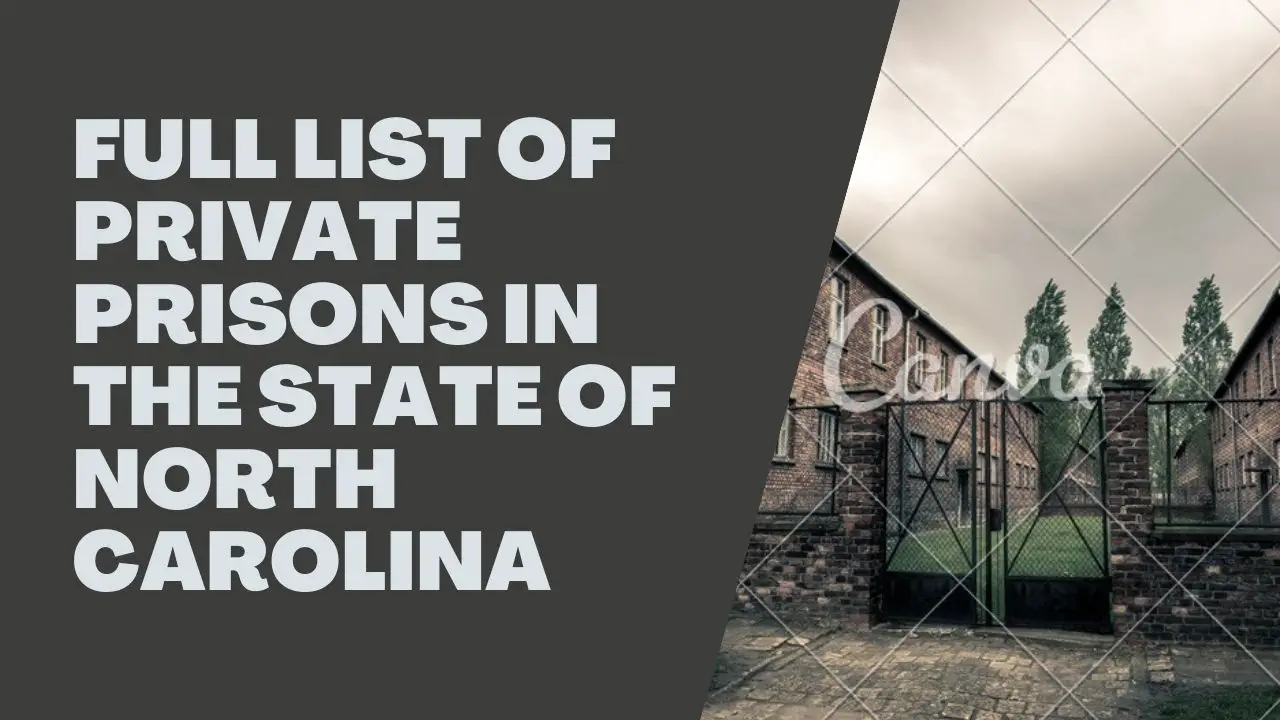Full List of Private Prisons in the State of North Carolina
If you are looking for a full list of private prisons in the state of North Carolina, we have you covered!

North Carolina is a Southeastern state in the US with the 9th highest population and 28th largest area. The state has a population of 10,439,388, according to the 2020 census. Besides being on the list of the top 10 highly populated states in the US, North Carolina also has an alarming incarceration rate of 617 per 100,000 people.
It means 617 out of every 100,000 people are in state, federal, and private prisons. This article brings you the list of all the private prisons in the state of North Carolina and related details.
Incarceration in North Carolina
57,000 people from North Carolina are behind bars serving their time in jails and prisons across the country. The criminal justice system in North Carolina sends around 128,000 individuals to local jails every year.
The incarceration rate of 617 in North Carolina is slightly less than the US national average of 664, but it is higher than many other democracies globally.
Around 29,000 offenders out of these are in state prisons, while 8,800 are serving time in federal prisons; 18,000 are in local jails. Some particular offenders are also sent to youth and involuntary commitment facilities.
Youth facilities host 740 inmates, whereas involuntary commitment facilities have 210 individuals. 59,000 incarcerated individuals are under probation, while 9,000 are under parole.
Prison and jail incarceration rates have been steady in North Carolina over the past half a century. The prison incarceration rates in the state hiked in 1996 but came down in 1999; they have been steady since then. Jail incarceration rates have been almost uniform between 1999 and 2014 with a dip in 2009.
North Carolina Incarceration by Ethnicity
Before we jump to the list of private prisons in the state of North Carolina, here’s a little insight into prison trends in North Carolina.
According to 2010 statistics, Black people had the highest number of incarcerations in the state. The North Carolina prison system incarcerated around 1,665 black individuals, followed by 883 American Indians, and 491 Hispanics per 100,000 population. The number of incarcerated white people in 2010 came to around 357 per 100,000.
List of Private Prisons in the State of North Carolina
Rivers Correctional Institution was the only private prison in North Carolina. North Carolina has no private prisons right now as it did not renew the private prison contract after 2021.
Rivers Correctional Institution
The GEO Group owned and operated the Rivers Correctional Institution in the unincorporated Hertford County, North Carolina, since 2001. The 257-acre prison was built to keep prisons from the Lorton Reformatory in Columbia.
- Facility type: Private
- Security level: Low-security
- Number of beds: 1,450
- Inmates: All males
The prison welcomed its first inmates from the Lorton Reformatory of the District of Columbia Department of Corrections which closed in 2001. Most prisoners stayed at Lorton Reformatory for around two years before being sent to Rivers Correctional Institution.
Approximately 66% of the private prison comprised federal inmates in 2007. In 2009, the prison held around 900 prisoners. The Rivers Correctional Institution was home to non-US citizens convicted of federal law violations and also facilitated people with mental health issues going through a re-entry program.
Inadequate Facilities
The Rivers Correctional Institution had only one on-site physician who worked less than 40 hours weekly. The facility did not have any drug and substance treatment program for the inmates and was considered the harsher treatment of federal inmates than other offenders.
Complaints started making rounds soon after the facility opened in 2002. The Washington Lawyers' Committee and Covington & Burling filed a class action lawsuit against the GEO Group regarding the medical situation.
However, Justice Department officials announced in August 2016 that the FBOP will reduce the use of private prisons as they are less safe with fewer correctional facilities for the inmates.
Closing of the Rivers Correctional Institution
Biden ordered ending BOP contracts with private facilities in 2021, including the Rivers Correctional Facility.
President Biden previously mentioned in his campaign, “To decrease incarceration levels, we must reduce profit-based incentives to incarcerate by phasing out the Federal Government’s reliance on privately operated criminal detention facilities.”
An Inspector General report in 2016 also states problems with violence and safety concerns regarding the Rivers Correctional Institute.
The Department of Justice had already decided not to renew the Rivers Correctional Institute contract, and it expired in March 2021. Later, former Deputy Attorney General Sally Yates also issued a memo to reduce private prison contracts. However, the Trump administration did not agree and renewed the contracts.
A GEO Group spokesperson called Biden’s executive order “a solution in search of a problem.” They mentioned, “President Biden’s Executive Order merely represents a political statement, which could carry serious negative unintended consequences, including the loss of hundreds of jobs and negative economic impact for the communities where our facilities are located, which are already struggling economically due to the COVID pandemic.”
Read Full List of Private Prisons in the State of New York
Additional Information about North Carolina Jails
- North Carolina jails charge up to $3.15 for a 15-minute phone call.
- Families of prisoners have to pay a 17% transfer fee to send money to an incarcerated individual.
- North Carolina prisons pay the prisoners as little as 5¢ an hour for their work.
- Incarcerated individuals must pay for hygiene items. The North Carolina prison system also suspended its $5 medical copays because of the pandemic.
Read A List of Private Prisons in The State of New Mexico
Final Words
North Carolina is a Southeastern state in the US with the 9th highest population and 28th largest area in the country. The high population also contributes to a high incarceration rate of 617 per 100,000 people in the state.
According to 2010 statistics, the highest number of incarcerations in the state was seen in Black people, followed by American Indians, Hispanics, and White individuals. The full list of private prisons in the state of North Carolina comprised only one prison: the Rivers Correctional Institute.
It closed in 2021 when the Biden government did not renew private prison contracts.
FAQs
Can the state legally prohibit the construction and operation of a private prison that will hold federal inmates?
No, the state cannot prohibit constructing and operating a private prison that will hold federal inmates. The Supremacy Clause of the United States Constitution does not allow state governments to interfere in federal government activities.
What are the five levels of prisons in North Carolina?
The classification level of prisons in North Carolina depends on the security needs of particular types of inmates. They are classified as minimum I, minimum II, minimum III, medium, and close security prisons.
Minimum III security prisons are the lowest security facilities in North Carolina.
Who is in charge of prisons in NC?
The federal government constructs and operates the federal prisons in NC, whereas the North Carolina Department of Public Safety Division of Prisons overlooks the state prisons.
What components of a federal prison can or must be regulated by the State or local government?
The state government cannot oblige federal prisons to follow any rules, yet it may enforce regulations regarding the construction and operation of private facilities.
At the same time, the federal government does not have to comply with local zoning ordinances or state building codes.
